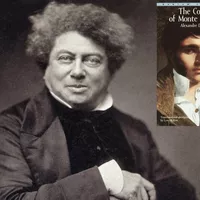Chapter 7. The Examination (2)
As he had now arrived at the door of his own house, which adjoined the Palais de Justice, he entered, after having, coldly saluted the shipowner, who stood, as if petrified, on the spot where Villefort had left him. The ante-chamber was full of police agents and gendarmes, in the midst of whom, carefully watched, but calm and smiling, stood the prisoner. Villefort traversed the ante-chamber, cast a side glance at Dantes, and taking a packet which a gendarme offered him, disappeared, saying, "Bring in the prisoner." Rapid as had been Villefort's glance, it had served to give him an idea of the man he was about to interrogate. He had recognized intelligence in the high forehead, courage in the dark eye and bent brow, and frankness in the thick lips that showed a set of pearly teeth. Villefort's first impression was favorable; but he had been so often warned to mistrust first impulses, that he applied the maxim to the impression, forgetting the difference between the two words. He stifled, therefore, the feelings of compassion that were rising, composed his features, and sat down, grim and sombre, at his desk. An instant after Dantes entered. He was pale, but calm and collected, and saluting his judge with easy politeness, looked round for a seat, as if he had been in M. Morrel's salon. It was then that he encountered for the first time Villefort's look,--that look peculiar to the magistrate, who, while seeming to read the thoughts of others, betrays nothing of his own. "Who and what are you?" demanded Villefort, turning over a pile of papers, containing information relative to the prisoner, that a police agent had given to him on his entry, and that, already, in an hour's time, had swelled to voluminous proportions, thanks to the corrupt espionage of which "the accused" is always made the victim. "My name is Edmond Dantes," replied the young man calmly; "I am mate of the Pharaon, belonging to Messrs. Morrel & Son." "Your age?" continued Villefort.
"Nineteen," returned Dantes. "What were you doing at the moment you were arrested?" "I was at the festival of my marriage, monsieur," said the young man, his voice slightly tremulous, so great was the contrast between that happy moment and the painful ceremony he was now undergoing; so great was the contrast between the sombre aspect of M. de Villefort and the radiant face of Mercedes. "You were at the festival of your marriage?" said the deputy, shuddering in spite of himself.
"Yes, monsieur; I am on the point of marrying a young girl I have been attached to for three years." Villefort, impassive as he was, was struck with this coincidence; and the tremulous voice of Dantes, surprised in the midst of his happiness, struck a sympathetic chord in his own bosom--he also was on the point of being married, and he was summoned from his own happiness to destroy that of another. "This philosophic reflection," thought he, "will make a great sensation at M. de Saint-Meran's;" and he arranged mentally, while Dantes awaited further questions, the antithesis by which orators often create a reputation for eloquence. When this speech was arranged, Villefort turned to Dantes.
"Go on, sir," said he. "What would you have me say?" "Give all the information in your power." "Tell me on which point you desire information, and I will tell all I know; only," added he, with a smile, "I warn you I know very little." "Have you served under the usurper?" "I was about to be mustered into the Royal Marines when he fell." "It is reported your political opinions are extreme," said Villefort, who had never heard anything of the kind, but was not sorry to make this inquiry, as if it were an accusation. "My political opinions!" replied Dantes. "Alas, sir, I never had any opinions. I am hardly nineteen; I know nothing; I have no part to play. If I obtain the situation I desire, I shall owe it to M. Morrel. Thus all my opinions--I will not say public, but private--are confined to these three sentiment,--I love my father, I respect M. Morrel, and I adore Mercedes. This, sir, is all I can tell you, and you see how uninteresting it is." As Dantes spoke, Villefort gazed at his ingenuous and open countenance, and recollected the words of Renee, who, without knowing who the culprit was, had besought his indulgence for him. With the deputy's knowledge of crime and criminals, every word the young man uttered convinced him more and more of his innocence. This lad, for he was scarcely a man,--simple, natural, eloquent with that eloquence of the heart never found when sought for; full of affection for everybody, because he was happy, and because happiness renders even the wicked good--extended his affection even to his judge, spite of Villefort's severe look and stern accent. Dantes seemed full of kindness.

